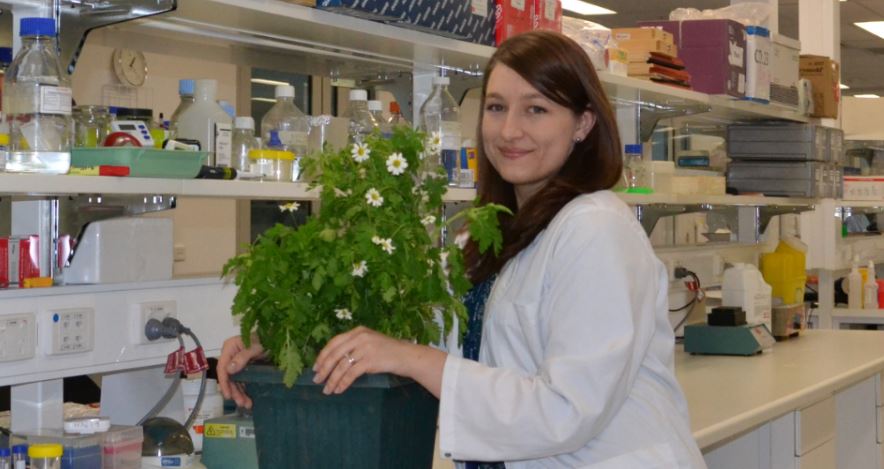
A surprise discovery by researchers at Flinders Centre for Innovation in Cancer is giving hope for men with the most aggressive and incurable form of prostate cancer.
Two years ago, a Flinders University research team led by Professor Pam Sykes started investigating how parthenolide – a naturally occurring anti-inflammatory compound found in feverfew daisies – could aid radiotherapy by attacking tumours while also protecting nearby heathy cells, potentially increasing survival rates while also helping to eliminate the nasty and debilitating side effects of radiotherapy.
Further research has demonstrating that Parthenolide may also have the ability to prevent aggressive and incurable metastatic prostate cancer.
“When we started this research, we were really just focusing on using parthenolide in radiotherapy, but this side-project looking at slowing down tumour progression evolved and has been a bit of a surprise,” says Flinders Centre for Innovation in Cancer (FCIC) postdoctoral researcher Dr Katherine Morel from the Flinders University College of Medicine and Public Health.
“Many men with localised prostate cancer can live for a long time, but when the cancer becomes metastatic – meaning it spreads from the prostate to other parts of the body – unfortunately it’s incurable,” she says.
Part-funded by Flinders Foundation, preliminary results of the latest research have shown slower tumour growth and a reduction in metastatic tumours when treated with dimethylaminoparthenolide (DMAPT), a water-soluble version of parthenolide.
“When combined with radiotherapy, the drug induces greater cancer killing, particularly targeting high-grade tumours which tend to metastasise,” Ms Morel says.
“If we could give it to men with early stage prostate cancer, or men who may be more susceptible to prostate cancer, then it may have the potential to reduce the severity of the cancer or even reduce metastasis all together.”
The latest research holds great hope for the thousands of men who will be diagnosed in future.
“Science is long-haul and it can take time to see results – the work that’s now emerged on metastatic tumours has far and away exceeded what we expected to find.”
Dr Morel has been collaborating with Professor Christopher Sweeney from Dana-Farber Cancer Institute at Harvard Medical School in Boston, who is currently testing parthenolide in leukaemia clinical trials.
Prostate cancer is the most commonly diagnosed cancer in Australian men.
While significant improvements have been made in prostate cancer therapy, there is still a need for novel treatment options, particularly for preventing and treating metastatic prostate cancer which has a very poor prognosis, and for protecting from unwanted debilitating side effects of radiotherapy due to damage done to healthy tissues near the prostate.
“When delivered prior to radiation, DMAPT was able to reduce cell death in healthy cells during radiotherapy while also increasing prostate cancer killing particularly in more advanced regions of prostate cancer, providing the potential to increase cure rates,” she says.
“Analysis of the prostate tumours identified important molecules involved in the mechanism of parthenolide protection, which support the potentially broader application of DMAPT for a number of different cancer types.”
Dr Morel and fellow FCIC researchers Dr Amanda Aloia and Lauren Thurgood will talk about their research at the “Flinders Foundation Shark Tank” session on the first day of the Flinders Health Research Week (4-8 September). Their “Inspirational and Dynamic Researchers Within Cancer” session commences at 11am on Monday 4 September at the FCIC lecture theatre, Flinders Drive, Bedford. All welcome. Register here.

